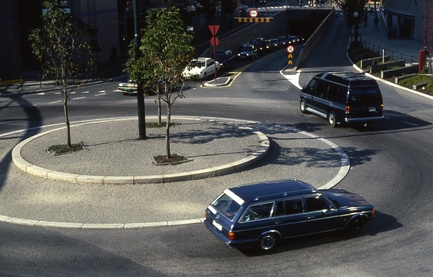
The cause of a squeaking noise in a front tire may not be immediately obvious, but you can narrow it down to one or two possible causes with a little detective work. Pay attention to the conditions when you hear the squeaking in the tire. A constant squeaking whenever the car is driven will have a different cause than an intermittent noise will, but a constant noise is generally easier to diagnose.
If your car has a squeak or squall in one front tire when turning tight corners, such as in a parking garage, start the diagnostic process with checking the tire pressure. Underinflated tires are the chief reason for this type of noise. Check the chart in your owner's manual for the recommended air pressure for the tires on your car, then inflate them to that specification. Do not assume that a tire that looks good has the correct air pressure.
Many cars are equipped with a sounding device called a wear indicator as a part of the front brake pads. When the brake pad wears to a certain point, the wear indicator makes light contact with the surface of the brake rotor, causing a high-pitched squeak whenever the car is driven. Noises caused by a wear indicator will disappear when the brake pedal is pressed and the brake is applied but will return almost immediately upon release of the brake pedal.
Misalignment of the front end may cause a squeaking due to front tire wear. Generally, this condition is caused by component wear or damage after striking a severe bump and results in a constant noise which will be lower in tone than that of a wear-indicator noise. The car may also pull to one side or wander while driving. Checking the front tires for uneven wear, especially on the edges, is important as such wear could be dangerous.
A common cause of an intermittent squeak in front tires is a loose wheel cover. As you drive, the cover moves about on the wheel, producing a squeak which may or may not be accompanied by a rattle. Generally, wheel-cover noises are light, intermittent and high-pitched. Remove the wheel cover and test-drive the car. If the noise is gone, the wheel cover is the problem.
Many noises may appear to be tire noises but are not. In older cars a rusted or bent brake-backing plate may contact the back surface of the brake rotor and, much like a wear indicator, cause a high-pitched squeak. Again, this noise occurs only when the car is driven. Unlike a wear-indicator noise, the sound will persist when the brake is applied. Rarely, a small stone trapped between the backing plate and rotor causes much the same sound.